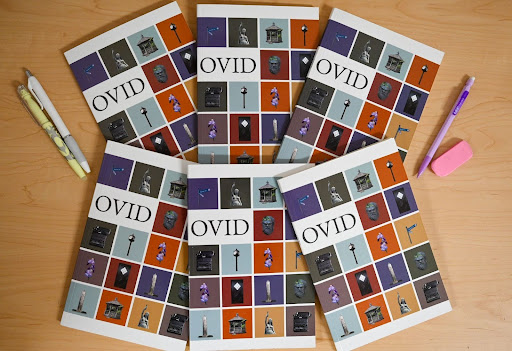“Ovid” is a work of art inside and out. Photo by Darcy Leber.
JACK WILLIAMS | CULTURE CO-EDITOR | jrwilliams@butler.edu
It takes bravery and vulnerability to share one’s creative work. The author must open their deeply held beliefs to criticism and face perspectives they have never considered. The payoff is that both the author and the work are empowered by contact with the community.
This is especially true for first-years who are encountering, for possibly the first time, opportunities to share their work on a wide scale. From Manuscripts to the Undergraduate Research Conference, Butler University provides many excellent platforms where students can be published. However, “Ovid” — formerly known as “The Mall” — is a journal that meets the unique need for a publication dedicated to underclassmen.
Professor Nick Reading, the faculty advisor for “Ovid” and a First-Year Seminar (FYS) professor, is proud to share that the mission behind “Ovid” has remained consistent since its inception.
“[Professor emeritus Susan Neville and I] started ‘The Mall’ in 2023,” Reading said. “We wanted it to be run for students and by students. As faculty advisor, I’m just trying to gather folks and create the [right] environment.”
Every component of “Ovid”, from the editing committee to the students who submit their creative works, consists of underclassmen. The journal accepts writing of any variety, from poetry to literary criticism and in-class journals.
The editing committee considers criteria such as quality of structure and reliability of sources in analytical essays. For creative works, elements such as voice, style and reader engagement take precedence. These works can then be read both for enjoyment and used as model texts for FYS professors to show their students.
Professor Reading reflected on how dedicated the editors are to the process of selecting what submissions to include.
“You’re coming to all of this work and you can’t bring bias with you,” Reading said. “You can’t say, ‘I don’t like this essay because I haven’t read the book or seen the movie.’ That’s beside the point — if it’s a successful essay, you shouldn’t have had to read the novel. Hopefully, you are moved to go find that [novel].”
Sophomore pre-pharmacy PP2 major Meiwen Yang served as Ovid’s 2023-2024 co-editor-in-chief and cover designer. She felt that reading through the wide array of submissions brought her closer to her peers.
“I learned that [students] have different voices,” Yang said. “Even within the same class, on the same topics, they have different angles. [It’s] interesting and inspiring when I read them. This is such a good opportunity to learn about my peers. If my peers can do it, maybe I can do it, too.”
Yang got involved through her FYS professor and last year’s First-Year Experience Letter Contest. She is also a contributor whose submissions include a pop culture analysis of the use of doors in season four of “Stranger Things”, which she later presented at the Undergraduate Research Conference.
For Yang, “Ovid” provides a place where first-years can participate in artistic life on campus without feeling intimidated by submitting work alongside students with three or four more years of experience.
“As a first-year, [getting involved] felt very overwhelming since there was already a [system] of belonging in place,” Yang said. “[I was] the new person squeezing in. Having this opportunity that is only open to first-year students is welcoming.”
Editing is not the only way to be involved, either.
Sophomore exploratory business major Crystal Longinos has been passionate about photography for several years. She brought this passion to “Ovid” as the cover photographer for the 2023-2024 issue.
“At first I was really nervous because I didn’t think I had the capacity to do a magazine cover,” Longinos said. “After we got the finished product, [though], I felt proud of it and excited I got to be part of the magazine.”
Inviting first-years to the world of publishing in any capacity is vital, both for the students themselves and Butler’s community.
Submitting a work means taking ownership of every part of it, from triumphs to mistakes. Additionally, one must learn when to accept constructive criticism and when to stick with their gut and resist making a change. These are skills that students can bring to other parts of their lives, whether during a Thanksgiving dinner conversation with family or in the office.
Providing a space for first-years’ voices to be heard also strengthens campus connections. Faculty and students of all years need to understand each other to learn and collaborate together. Elevating fresh perspectives keeps new ideas flowing through campus.
In the interest of further connecting students, “Ovid” is holding a First-Year Experience Letter Contest which is open to all sophomore students. They are invited to submit a letter to a hypothetical first-year student sharing their experiences and advice, according to the submission guidelines posted on the journal’s Digital Commons website. The contest deadline is Oct. 11, 2024.
“We want it to be [engaging] and honest,” Reading said. “I think if I was a first-year and I got my hands on “Ovid”, the letters would be the very first thing I read. It’s great advice when you don’t have to ask out loud for help.”
A journal’s worth is tied not to prestige or resale value, but to how effectively it reaches out to the community of readers and creators who pour their hearts into it. In that case, “Ovid” is worth its weight in gold.
If first-year students are interested in submitting to “Ovid”, they can access the submissions page on the journal’s website. They can also ask their FYS professor about opportunities to submit works to “Ovid” or any other on-campus publication.



